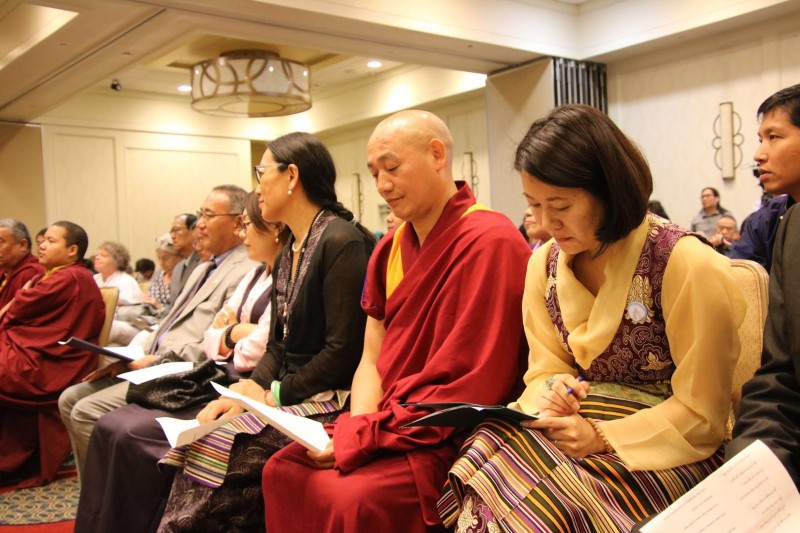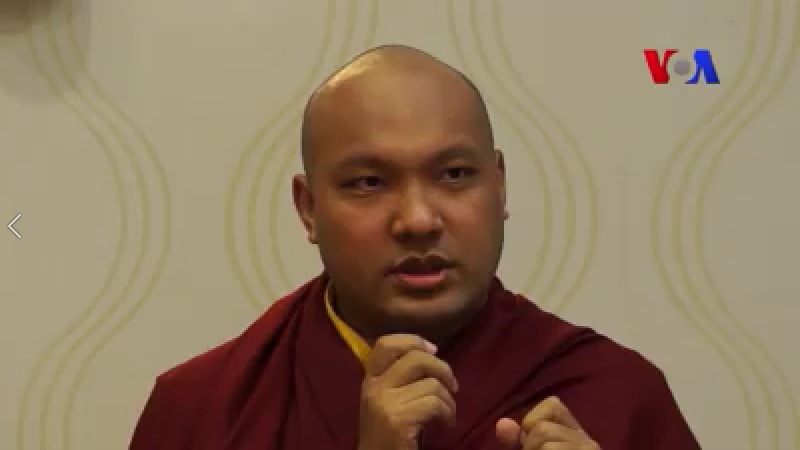法王新闻 | 2018年07月
『美国』敦促藏人要和睦相處
『U.S.』The Importance of Harmony among Tibetans
時間:2018年07月12日 12 July, 2018
地點:美國 維吉尼亞州 The Marriot Conference Hall, Tysons Corner Marriott, Tysons, Virginia, USA

After giving a talk on the Eight Verses on Mind Training, His Holiness met with the local Tibetan community and spoke to them directly in Tibetan. He began by thanking Capitol Area Buddhist Association and the Tibetans living in the region for all their good work. He also mentioned the important organizations in the DC area, which are greatly benefiting the Tibetans: the International Campaign for Tibet (ICT), the Voice of America (VOA) and Radio Free Asia (RFA), all of which are helping to create a true picture of what is happening with the Tibetans living in Tibet and abroad.
在〈修心八頌〉開示圓滿後,法王噶瑪巴接見當地藏人團體,並直接以藏文發表談話。法王首先感謝首府地區佛教協會以及當地藏人的辛勞。接著,法王提到在華盛頓特區對藏人貢獻卓著的幾個重要團體——國際聲援西藏運動、美國之音,以及自由亞洲電台 , 他們有助於將境內和境內藏人所發生的時事,完整如實的公諸於世。
The Karmapa prefaced his remarks by urging the Tibetans to recall the situation in Tibet that forced them to leave. Why was it they had to become refugees? He then turned to the critically important topic of all Tibetans maintaining good relationships with each other.
法王敦促,藏人要想想當初他們被迫離開時,西藏是什麼樣的局勢?為什麼他們要成為難民?接著,法王切入藏人應當和睦相處的重要課題。
If we look at recent Tibetan history, he pointed out, we can see periods of darkness when people in Tibet have suffered terribly. It is safe to say that the Tibetans living abroad have not known such misery. This makes it even more important that all Tibetans live in harmony with each other. In particular, people have become strongly identified with the idea of belonging to one of the three regions of Tibet (Central Tibet, Kham, and Amdo),
法王指出,如果去看西藏的近代史,我們會看到西藏生靈塗炭的黑暗時期,那種慘況可以說是境外藏人從所未聞的,因此,藏人彼此的和諧關係更加重要。尤其,大家已經有強烈的地域之見,認為自己是屬於西藏三區(衛藏、康區、安多)當中某一區的人。
and the Karmapa urged them to relate amicably with each other and take the broader view of considering` themselves to be one people. They should train in thinking of the Tibetan people as a whole. We must work, he said, to make this a stable view and guard it at all times. In general, it is not easy to create a harmonious group, he noted. It is difficult, if not impossible, to listen to and follow the opinion of each person. On the other hand, to make everyone the same is also not feasible. We can, however, remain in harmony with each other.
法王呼籲,大家應該善待彼此,以更開闊的眼界,視彼此都是屬於同一個民族。大家都應該學習把藏人視為是一個整體。法王表示,我們必須努力穩固並恆時護衛這樣的觀念。一般而言,打造一個和諧的團體並非易事。要聆聽和理解每一個人的意見,雖然並非不可能,但就是有難度。另一方面來說,把每個人都變成同一個樣子,這也行不通。然而,維持彼此的和諧關係,這點是做得到的。
The Karmapa then turned to his personal history, relating that when he was growing up in the remote region of his homeland, the idea of a single Tibetan people did not exist. He recalled that they called themselves Khampas (a term for the eastern Tibetan cultural area), and those who lived in Central Tibet around Lhasa were called Tibetans. The Khampas, he remembered, said things about the Central Tibetans that were not very nice and it was probably better not to repeat them here. Since parents had passed along to their children the idea of these three regions as separate entities, the Tibetans lacked the concept of their people as a whole.
法王接著舉他個人的經驗為例,他出生成長的家鄉地處偏僻,「一個藏民族」的觀念根本就不存在。他家鄉的人稱自己是康巴人,那些住在衛藏地區拉薩附近的才叫做西藏人。他記得,那時還會說衛藏西藏人的壞話,那些話最好就別在這裡轉述了。由於做父母的把這種三區分立的觀念傳給了自己的孩子,所以,藏人缺乏「西藏民族為一體」的這種想法。
The Karmapa remarked that he had had doubts about this term “the Three Regions,” so he asked authorities in Tibetan history about it. It seems that Chogyal Phakpa (1235-1280) had used the term, but that was a way of talking about something from hundreds of years ago. How could a label posited so long ago help us now? We need a long-term and reliable historical source for the word, the Karmapa stated, but that does not exist. He then suggested that one could look into the actual size of these three areas. However, if you ask, “How big is Central Tibet? What are its exact dimensions?” no one can answer. It is the same for Kham or Amdo. Since there is no clear answer, what is the basis for giving names to these three areas?
法王指出,他自己對「三區」一詞有所疑慮,他曾經請教過西藏史的權威,「三區」一詞確嘉.帕巴(Chogyal Phakpa) (1235-1280)似乎用過,但這是好幾百年前的用法,這麼古老的標示至今對我們還會有用嗎?我們要有「三區」一詞長期和可靠的史料出處,但那並不存在。因此,法王建議,我們不妨研究一下這三個地區的實際大小。但如果你問:「衛藏有多大?它實際的大小是多少?沒有人能回答,對於康區和安多也是如此。既然得不到一個明確的答案,把這些名稱安立在這些地區上又有何依據呢?
From another angle, the Karmapa proposed, we can see that the term the Three Regions has been used a lot, and this repetition in itself has created partisan feelings. People think, “I’m a Central Tibetan.” “I’m a Khampa.” “I’m from Amdo.” Tibetans have become habituated to this usage without thinking much about it. The main thing, the Karmapa counseled, is not to follow what our parents did, but to use our own minds to reflect and observe how such bias arises.
從另一個角度來看,法王提出,我們可以看到「三區」一詞經常被使用,而使用的次數多了便造成一種派別感,大家會這麼想:「我是衛藏人」,「我是康巴人」,「我來自安多」。這樣的說法大家都習以為常,卻沒有好好去思考,大家不應該盲從父母輩的習慣,而是要用心去反思,去觀察這種偏見是如何產生的,這才是主要的。
From the point of view of a mahayana practioner, the Karmapa continued, the Dharma does not support the fostering of divisions by thinking “This is my side and that’s yours,” and on this basis, letting anger and attachment arise. In the mahayana, we develop the view of equality that sees all living beings without prejudice; we seek to reduce our partiality, anger, and attachment and finally become free of them. Not doing this is especially destructive, the Karmapa asserted, if we consider the desperate situation in which Tibetans find themselves these days, and yet knowingly, we Tibetans still act in ways that make our plight worse.
從大乘修學者的觀點來說,佛法也不贊同這種分化性的思維:「我是這一邊,你是在那一邊。」瞋恨和貪欲就是從這當中生起的。大乘佛法中,我們培養的是平等見,看待一切眾生無偏無私,把自己的偏見、瞋恨和貪欲減少,最終完全予以淨除。如果不這麼做,後果尤其不堪設想。法王強調,藏人明明知道近來自身的處境危急,但還是做出令情況雪上加霜的行為。
So we must use all our mental resources to consider this situation, the Karmapa counseled, and know clearly what we should leave behind and what we should take up. The lamas teach us this, but we do not follow their advice. Right now it is critical that each person examine their own mind and see what to adopt and what to reject without making mistakes.
所以,我們必須以全副的心力好好思考這種情形,然後清楚知道何者該捨、何者該取。上師教導我們這點,但我們並沒有遵循。現在正是關鍵的時刻,我們每一個人都必須檢驗自己的內心,知道何者該捨、何者該取,沒有失誤。
The Karmapa also spoke of His Holiness the Dalai Lama and how hard he has worked over the years to support the cause of Tibet—his activity is inconceivable. And still, we do not follow his advice. Sometimes, the Karmapa remembered, that he had had the good fortune to visit His Holiness and previously, he would emphasize the larger picture, encouraging the Karmapa to think in a vast way. His Holiness would say, “Don’t let your mind be small. Don’t let it shrink.” But to be honest, the Karmapa said, sometimes he was a bit disappointed. He would say that from his young years until now he had worked hard, but these days, it seemed that all this effort had not brought much benefit.
法王還提到,達賴喇嘛尊者多年為支持西藏運動而努力,尊者的事業不可思議。然而,我們卻沒有遵循他的指示。法王回憶,之前,在他有幸得以謁見尊者時,尊者總是強調眼界要放大,鼓勵他以大局來看事情。尊者會這麼說:「別讓你的心變得狹小,別讓它縮小了。」法王表示,坦白說,從小到大他都一直很努力,但是這些日子以來,他所有的努力似乎沒有帶來太大的利益,因此,有時會有點失望。
So we need to think about this, the Karmapa urged, and not only in relation to His Holiness. We need to think critically about what we have inherited from our parents and think seriously about the future and where this feeling of partisanship among the Tibetans of the three areas will lead us.
我們必須好好思考一下,法王敦促,不僅是跟尊者有關的事情,還必須嚴格的思索我們承續自父母的觀念,認真思考三區藏人的這種派別感,它會帶給我們一個什麼樣的未來。
The Karmapa also spoke about the importance of the Tibetan language. Among Tibetans there is a lot of talk about Dharma and Tibetan culture, he remarked, but actually the root of these two is the spoken and written language, which must be preserved. The Tibetans who live outside Tibet have had a very hard time sustaining their language, as he has learned in meeting many of the Tibetans who were born and grew up abroad. This is a very sad situation, he said. It means they have not been able to carry the responsibility of preserving their culture. Tibetans tend to talk a lot about outer circumstances but not so much about how to work and accomplish projects. The most important thing for people is their children but outside of that, there is not much that catches their interest.
此外,法王還談到西藏語言的重要性。藏人之間會談論很多關於佛法和西藏文化的事情,但實際上這兩者的根基都在於書寫式和口語式藏文,而且這兩種藏文形式都必須保存。法王指出,當他接見在海外出生長大的藏人時,他發現他們許多人都有說寫自己母語的困難,這種情形非常悲哀,因為這代表著他們無法承擔保存自己文化的責任。
“From another point of view, the situation of Tibetans, in fact, is not easy, he conceded. Given their surroundings, it is difficult to learn Tibetan well. It is also true that people have not made great efforts to find a means to correct this situation. So it is important that we discuss how to learn Tibetan well.
藏人總是很會講外在的環境條件是如何如何,但鮮有人會去談如何推動或成辦一個計劃,大家最看重的是自己的小孩,除此之外,沒有什麼能引起他們的興趣。從另一個角度來看,藏人的處境實為不易,因為他們所置身的環境,要把藏文學好很難。再者,大家確實也沒有努力去找方法來糾正這樣的情況。因此,重要的是,我們一起來討論如何把藏文學好。

These days, there are many non-Tibetans who take a great interest in the Tibetan language. Some say that there are more foreigners studying Tibetan seriously than Tibetans themselves. I do not know how true this is but many people from the West and the East come to me and say they want to learn Tibetan. Some are in their forties and fifties and they still ask, “To know Dharma well, do we need to learn Tibetan? If so, I’ll study it.” Sometimes I try to stop them and say, “Oh it’s very difficult and takes a lot of time. You’re already forty or fifty and if you focus on it, you’ll use up the time remaining in this life,” yet they still want to learn.
近來,有許多非藏籍人士對西藏語言有很大的興趣。有人說,現在認真學習藏文的外國人比道地的藏人還多。我不知道這種說法的正確性有多高,但許多在東方和西方的外國人來見我,他們告訴我,他們想學藏文,他們有些都四、五十歲了,但還是會來問我:「如果要把佛法學好的話,我們需不需要學藏文?如果需要的話,我就會去學。有時,我會阻止他們:「嗯,這很難喔,而且要花很長的時間。你都已經四、五十歲了,如果專注在這上面的話,它可是會耗掉你全部的餘生。」即便如此,他們還是想要學。這情況還挺奇怪的,外國人來求我讓他們學藏文,而我卻要對藏人同胞說:「拜託,拜託,請學學你自己的語言。」這真是顛倒了。
It is a strange situation. Foreigners are pressuring me to learn Tibetan, and we are saying to the Tibetans themselves, “Please, please, learn your language.” The situation should be reversed. It is crucial that we study our written and spoken language, which is also belongs to a small group of languages in which Buddhism has been transmitted. It is a fact that language learning comes about in dependence on situations and we must influence these in a positive way. Parents must make efforts so that their children can learn Tibetan. They must be the teachers. The Karmapa concluded by saying that everyone has to take responsibility—the Tibetan society in general, each household, and all friends, whether female or male.
把我們自己的書寫式和口語式藏文學好,這點非常重要。佛法是透過少數幾個語言在傳遞,而藏文是其中之一。語言的學習有賴於環境,而我們必須以正面的方式來影響環境。父母得下功夫讓自己的孩子學藏文,而且父母必須自己就是老師。結語中,法王呼籲,這樣的責任每一個人都有——無論是藏人社會也好,每個家庭也好,無論男女都責無旁貸。
网页修改记录:2020年2月18日,新建中英网页,放置本网站视频;2024年4月05日,删除视频;放置剪辑音频和图片,并将网页链接从2018.07.12toTibetan.html改为2018.07.12-2。
